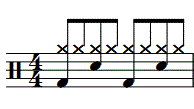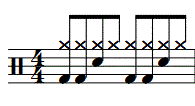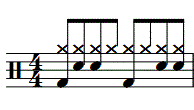In this online drum lesson we will discuss the basics of rock drumming. If you have just started playing drums, learning the basic of rock beats is an ideal place to start. The basic rock beat forms the backbone of many different kinds of music including rock, metal, funk, rap and R&B.
Before you start learning beats, there are a few technique tips you should keep in mind. When starting out, a lot of drummers will hit the drums with a firm grip, not letting the stick bounce. By doing this, you are making your job a lot harder. To start out, grab the drum sticks using your thumb and index finger. Your other fingers should hold the stick loosely.
Now, hit your snare drum and let the stick bounce. Explore holding the stick at a higher or lower point and keep hitting the snare and letting the stick bounce. What you are looking for is called the fulcrum point, the point where the stick will bounce best off the drum head. You want the drum stick to bounce at least four or five times. Don’t worry that the bounces get a lot weaker after each one. By taking advantage of the stick’s rebound, you have to do less work getting ready for the next stroke. If you are having trouble, that is okay. It can be a hard concept to get down. Make sure to ask your teacher for some technique tips in your next drum lesson.
The first element of the basic rock beat is the hi-hat. On the hi-hat you will be playing eighth notes. If you are playing eight notes, that means you are playing two notes per beat. They are counted 1 & 2 & 3 & 4 &. Once you feel comfortable with this you can add in the bass drum. You will be playing the bass drum on 1 and 3.
The main characteristic of rock drumming is the backbeat. In music, the first and third beats of a bar are usually the strong beats. A backbeat goes against this by playing the snare drum on 2 and 4. Once you add the snare drum on 2 and 4, you have yourself a basic rock beat. The final beat looks like this:
If you are having trouble, slow down. The slower you play the better.
Once you can play this beat at a medium tempo with a relaxed technique, it is time to start adding to it. We are going to expand this beat by adding 8th notes with the bass and the snare. The following beats are great to have under your belt. They are more interesting because more is happening, but they won’t get in the way of the other musicians.
In this example we are adding the bass drum to the &s of 1 and 3.
The last example of this drum lesson features some snare drum work on the &s. It might be tricky, so slow it down. The snare’s very direct sound does a great job at adding more power to a beat.
Try putting bass and snare drum hits on any part of the beat. With eighth notes alone you can come up with a lot of variations. Once you get this beat and some basic variations under control, you are ready to start jamming. Playing with other people is a great way to practice these beats. It can be a challenge trying to do your own thing when someone else is playing, but keep at it. If you feel ready, check the sidebar for a more advanced funk drum lesson.
Elite Music Academy offers drum lessons in Toronto for rock and all kinds of styles. If you live in Toronto, you can take a trial lesson to meet your teacher. Call 416-406-5355 for more info.












